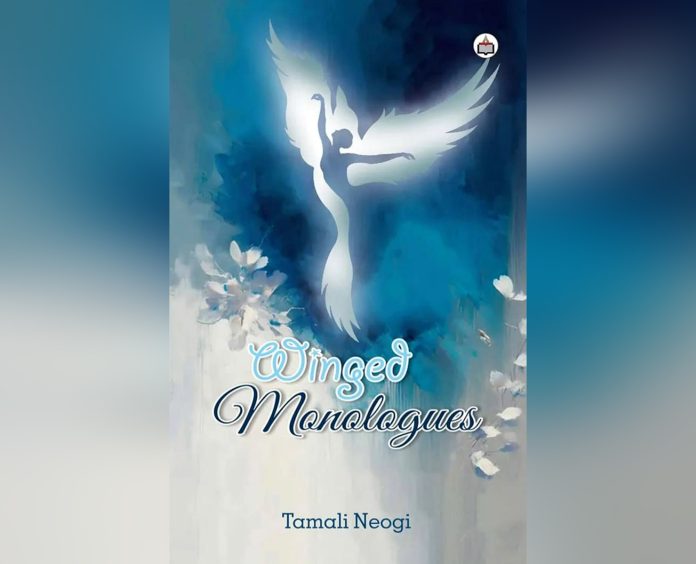Prof. (Dr) K.B. Razdan
Name of the Book: “Winged Monologues”
Author: TamaliNeogi
Year of Publication: 2024
Name of the Publisher: Authors press
Price: Rs.295
In her preface to this anthology of poems, titled “Winged Monologues”, the poetess TamaliNeogi makes an honest confession when she declares: “My poetry is flesh and blood of my innermost mind”.These words remind a well read and conscientious scholar of the well accepted fact, that the romantic will has now attained its objective: the dismembered head of Orpheus has started to sing anew. Being a poet myself, most of the poems in “Winged Monologues” made me to get launched into the cosmosphere of poetic plasma, thereby echoing the words of the poetess, Tamali herself: “I feel that a poet’s mind is an architect who builds a pleasant dome while his soul ascends the ‘narrow speak'” The seventy-five poems that comprise “Winged Monologues”, remind me about the myth of Orpheus: the frenzied Maenads dismember the poet, yet his head floating in the river Hebrus continues to sing-the conflict between Apollo and Dionysus, art and nature, form and energy, mind and intellect. Every conscientious poet, especially in the contemporary age of postmodernist problematics, is no “monster of hubris”, Tamali being no exception. All the poems in “Winged Monologues”, blend word and flesh into the daily dance of existence. Tamali sings her songs in the form of poems, each poem becomes the wings which make the poetess along with the readers, echoing Walt Whitman’s iconic opening lines of his epic poem: “Song of Myself”. “I sing myself and celebrate myself,/ And what I assume,/ You shall assume,/ For every atom belonging to me,/ belongs to you as well.”Tamali’s Orphic Journey in “Winged Monologues” across Seventy-five poems reflects an arresting poetic odyssey of the poetess Tamali herself, replete with a silence of fulness and another one of vacancy. It has been well said that silence invades all forms of speech and renders the grammar of language irrelevant. poems like “No Less than Death”, “An Cleopatra”, “I am you and you are me”, “Woman is like water”, “Need to know Thyself”, “Juliet must die”, “The Lady of Shalott”, “Dolls of the Disneyland”, “The Teacher in you”, and “The Dilemma of an Age”to name only a few, cumulatively reflect transcending metaphors of a transcendence that free the reader from the eclipsing “Prison of Consciousness”, only to make him or her feel how the machinery revolves in the lines of Tamali, poem after poem: “My naked beauty,/ simple, slim, silvery Alakananda/ made a beast of you”(“I am You and You are me”). And again: “Rarely I meet one who shares his happiness with all/ what insecurity drives man to unhappiness?/ I wish to know” inthepoem “ADropofTear”. Almost all the poems in “Winged Monologues”, reflect the archetypal world of Apocalyptic Symbolism: The Divine, the Human, the Animal, the Vegetable, and The Mineral. Cumulatively, these five worlds combine to make most of the poems as crystalline prismatic cubes, emanating rays of the solar spectrum to make the reader have a feast of “sumptuous” imagery, symbolism, metaphors, allusions and what not. In this context, I would like to make mention of the poem: “The Dust of Disgrace”.
The opening stanza of this poem sparkles with the rays of Humour, Irony and Satire in the fashion of Longinus, the great Augustan Critic whose “On The Submarine” has since become a Classic Exegesis on what constitutes “Sublimity”, primarily a loftiness and sheer excellence in expression and language.In “Winged Monologues”, TamaliNeogi’s use of the Sublime in her poetic parlance, excels time and again. A few examples: “Huge school bags bending the back of young coolies/ Bring home tiding of full marks and brilliance…”….”parental judgements paralyses, preoccupied minds forget to doubt” [The poem: “The Dust of Disgrace”] The poem “Eyes” reminds me of Kahlil Gibran’s poem “Song of Love”. “Eyes” open with these lines:
” Now I know your eyes
The deep, d-e-e-p well,
The gravitational force of the black water
Is too much to draw me downwards,
Soul in the glass of your eyes….
When I look up to see your face,
See a saint in white robe
Walking softly under the tree of sorrow ……..
My body, my soul, clad in your affection dissolves.
The new bride on the flower bed,
Each word uttered is a kiss.
Here, Tamali, the Apollonian poetess of Aphrodite’s bosom of love, echoes Kahlil Gibran’s line from his “Song of Love”:
“I am the lover’s eyes and the spirit’s
Wine and the heart’s nourishment”
I am a rose. My heart opens at dawn and the virgin kisses me and places me upon her breast.”
It won’t be an exaggeration to say that in her poetic anthology “Winged Monologues”, TamaliNeogi assumes the role of John Keats’ Nightingale, and signs her songs as poems which assume the wings of prismatic hues and fly like a sonorous lark, taking along the reader’s mind, soul and psyche. Cumulatively, the seventy-five poems form a super-spectrum from which these words ring out as a tune emanating from Tamali’s soul, mind and psyche:-
“I am the poet’s elation,
And the artist’s revelation,
And the musician’s inspiration.”
TamaliNeogi’s “Winged Monologues” makes me recall these lines of Khalil Gibran from his poem , “Song of The Rain”:
“When I cry the hills laugh;
When I humble myself the flowers rejoice;
When I bow all things are elated
The field and the cloud are lovers
And between them I am a messenger of mercy
I quench the thirst of the one;
I cure the ailment of the other.”


